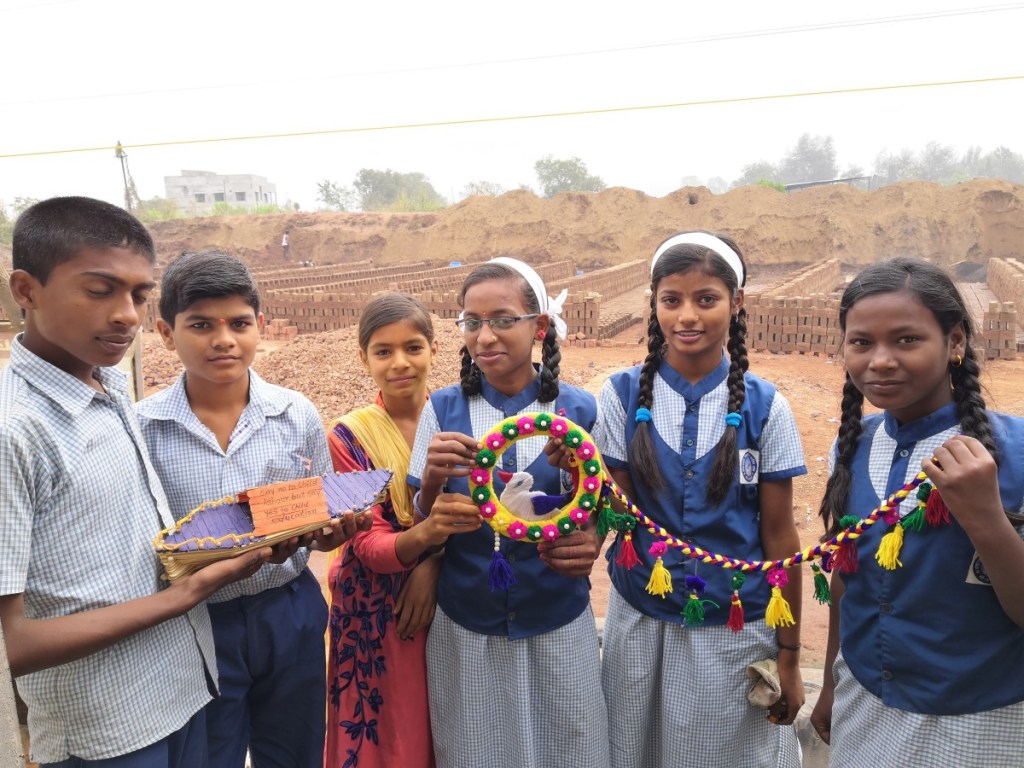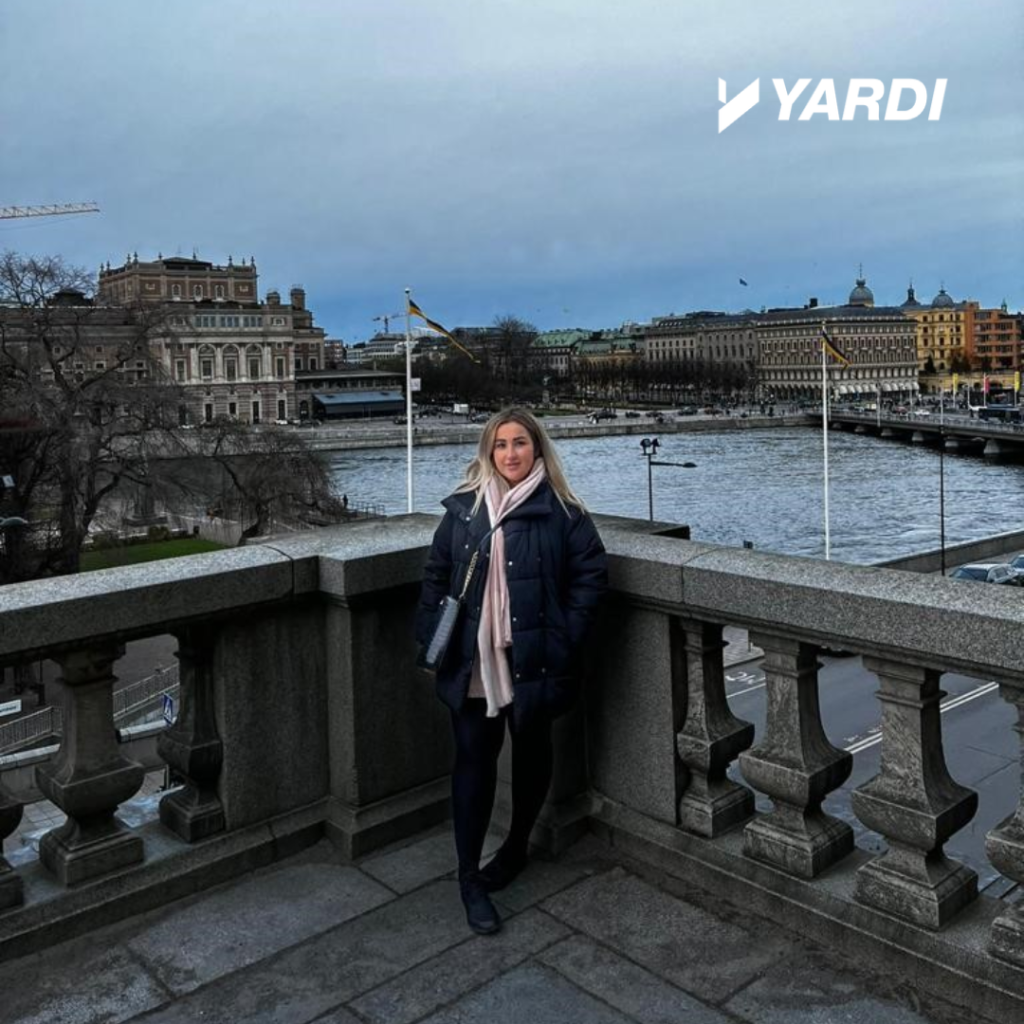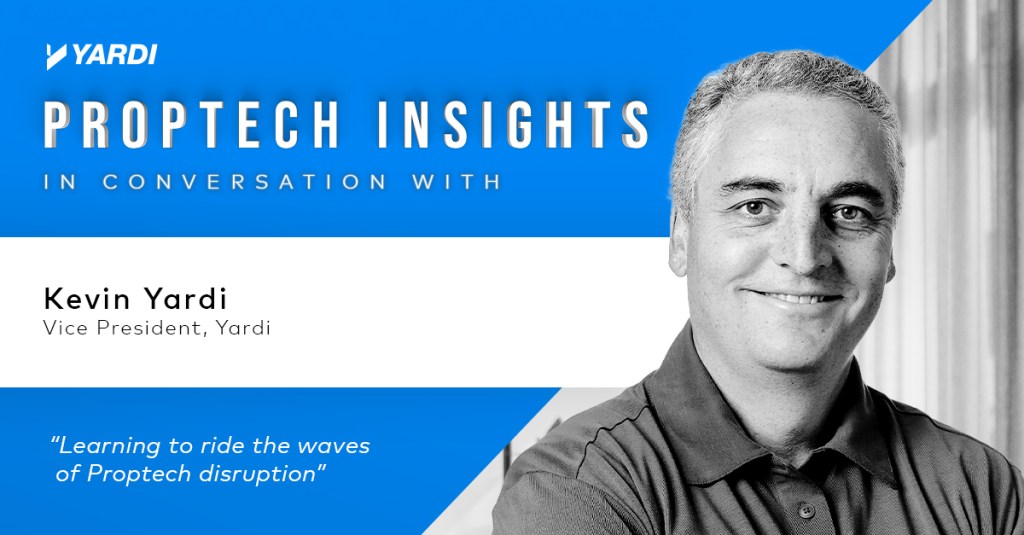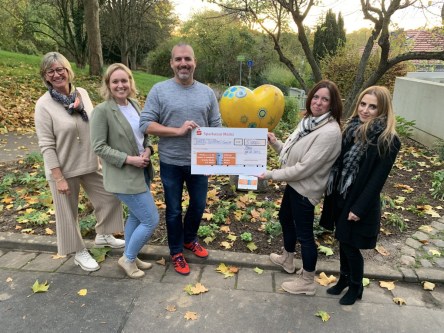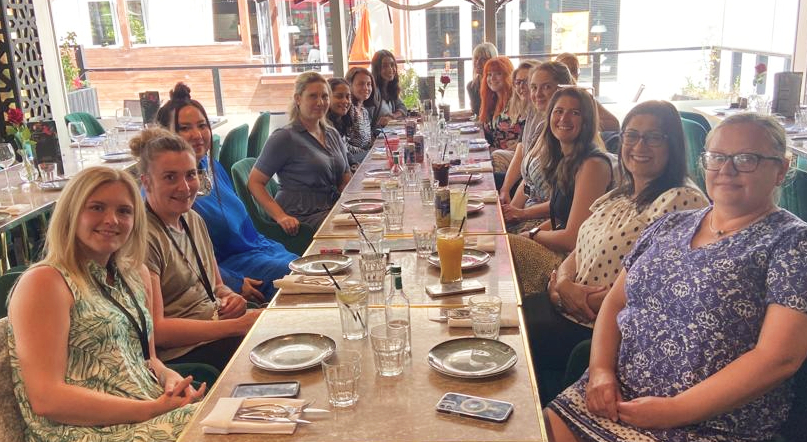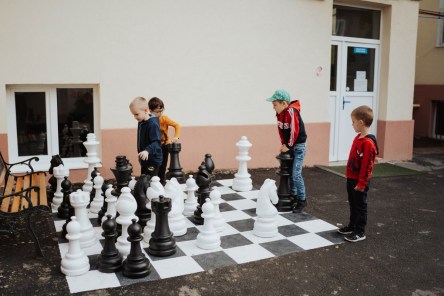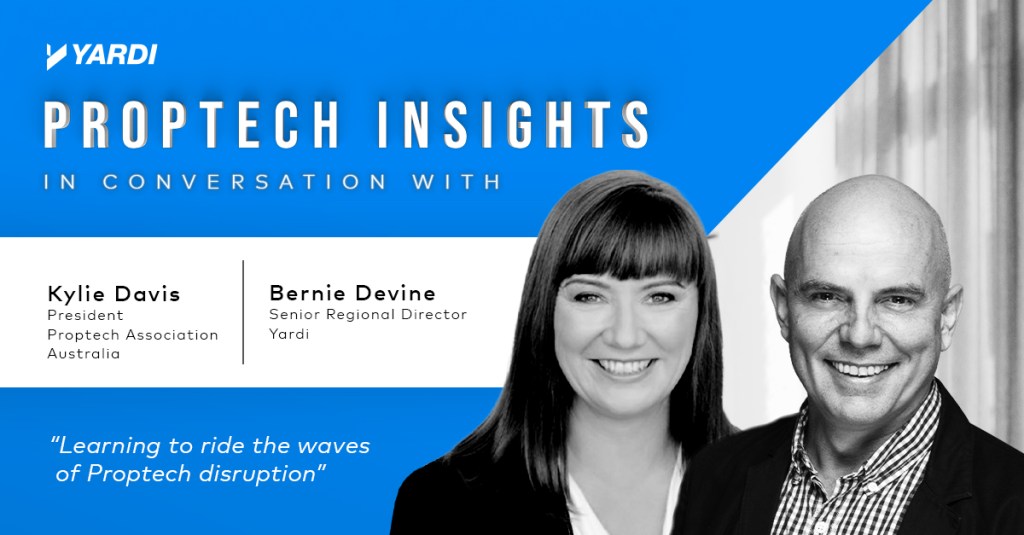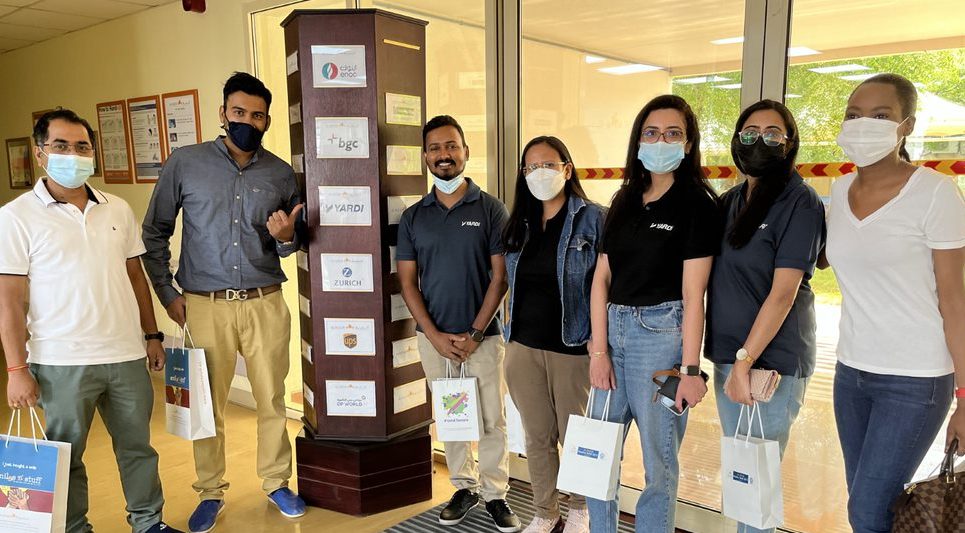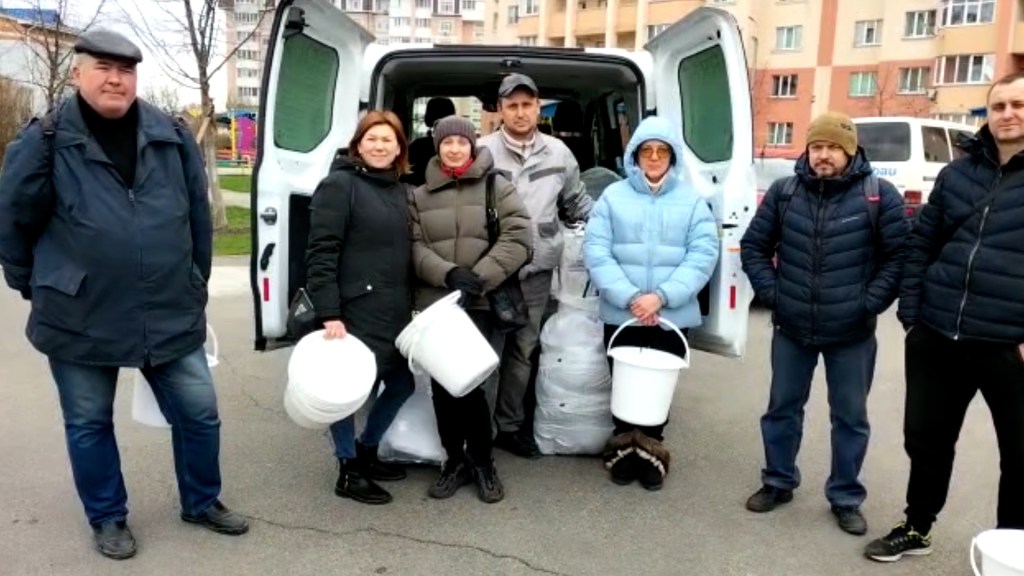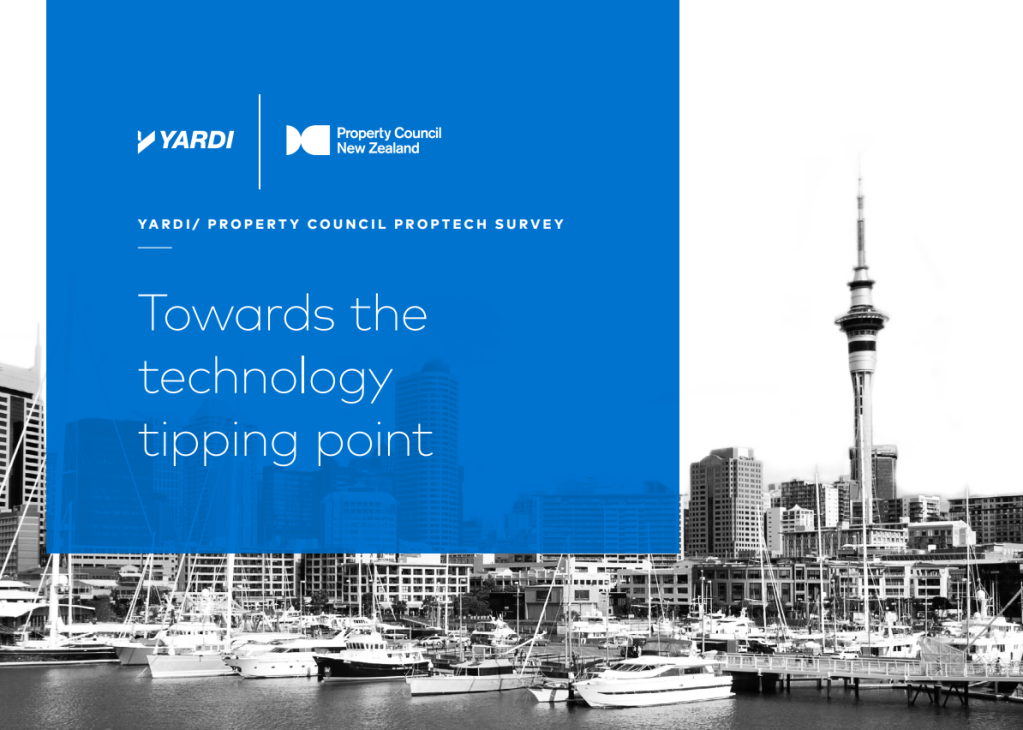The Yardi Dubai office is full of spirit, energy and fun group activities. Office manager Oksana Goliak coordinates the office to meet up for regular friendly competitive group sporting events. In 2021 they had a virtual climb of Mount Everest and had some skiing action for Ski Dubai. Then in 2022, they started the Yardi Sports League, which included cricket, badminton, football, and volleyball. Here is a look at some of their accomplishments of the past few years. When the pandemic hit and most were on lockdown, Yardi Dubai started to include some virtual team-building activities. In 2021 the Dubai team virtually climbed the highest mountain peak, Mount Everest. Each team member logged their steps into a daily group log with a challenging goal of 230 km in seven days. Cycling activities were excluded. Watch the video here: Next up in 2021 was Ski Dubai. The team gathered at an indoor skiing arena pictured here. Watch their outing here. In 2022, Yardi Dubai started the Yardi Sports League and gathered for cricket, football, volleyball, and badminton throughout the year. Pictured below is the cricket match. Watch the video here: Dubai Sports League: Football. Watch the video here: Dubai Sports League: Volleyball and Badminton. Splitting into two teams, The Black Panthers and White Tigers. The Black Panthers won the badminton trophy, and the White Tigers won the Volleyball...
Digital Assets Emerge
Proptech Insights with Alice Chen
A future of instantaneous settlement and no intermediaries is possible with the right infrastructure. Alice Chen, Bernie Devine’s guest on the latest episode of Yardi’s Proptech Insights, is busy building that infrastructure. The world of digital assets is taking shape before our eyes. In December, Larry Fink, CEO of BlackRock – the world’s largest asset manager with around $8 trillion in assets under management – predicted blockchain technology would open the door to the “next generation for markets.” Tokenisation can provide liquidity to illiquid assets – and one recent estimate suggests tokenising just 0.5% of the total global property market between now and 2026 would create a $1.4 trillion market. Alice Chen, co-founder and COO at InvestaX, was a real estate lawyer for many years, dealing with complex transactions “with a lot of intermediaries, a lot of paperwork and a lack of trust.” “I knew, if we could build trust into the process, we could save a lot of money and a lot of time,” Chen told Devine, Yardi’s senior regional director for Asia Pacific. With this insight and a desire to “democratise the real estate investment process,” Chen established InvestaX in 2015. Today, she and her co-founder Julian Kwan oversee Singapore’s leading digital securities platform. Tokenisation is the process in which a digital representation of an asset is created on a blockchain, authenticating its transaction and ownership history. Any asset – from art to real estate to bonds to carbon credits – can be tokenised. “And anything that has value, once tokenised, becomes a digital asset,” Chen explained. Cryptocurrencies such as Bitcoin and Ethereum capture a lot of headlines and headspace, but they are quite distinct from digital securities. Cryptocurrencies are a decentralised medium of exchange that operate independently of central banks or governments. Digital securities, on the other hand, are investment products that are represented in digital form and can only be bought, sold and traded on regulated platforms. Metaverse investments and digital securities “have different characteristics, regulatory parameters and tax implications,” Chen emphasised. “I agree. The path to success with digitisation of assets is one that is compliant,” Devine added. “By digitising an asset you also make it easier for software to deal with it… You are not relying on an external third party to stamp a piece of paper.” InvestaX is taking the “slow and long road” – one which is building relationships and advocating changes to often antiquated laws. “The US test for what is a security is based on case law from 1946,” Chen explained. One of the biggest hurdles to real estate tokenisation is the stamp duty or transfer tax applied each time the asset changes hands. But Chen can clearly see a future of instantaneous settlement and no intermediaries. “We have the opportunity in the private markets to introduce an entirely new infrastructure because we don’t have legacy systems. We can facilitate instantaneous settlement… but we can only do this if we have digitally native currencies and digitally native securities. That’s how we think the future will be and that’s why we are rebuilding an entire infrastructure around it,” she said. How long will tokenisation take to transform real estate? Download the latest episode of Yardi’s Proptech Insights webinar series with InvestaX’s Alice Chen to find...
YASC Global
Supplies Innovation On Demand
Next month, thousands of Yardi clients from around the world will join together in learning, fellowship and fun. The occasion is YASC Global, the fourth annual virtual Yardi Advanced Solutions Conference, which happens March 1-2. The conference, which is offered free with automatic registration for all Yardi clients, will showcase the company’s latest technology innovation updates through hundreds of new on-demand classes and spotlight sessions delivered on the company’s Yardi® Aspire platform.. Commercial, multifamily, senior living, affordable and real estate investment management are just some of the areas covered in the 250-plus class offerings. And, and always, YASC Global isn’t just about work – it also lets participants catch up with their industry peers, interact with Yardi solution specialists, and win daily prizes and big grand prizes at the end of the conference. In short, it’s a lot of fun! “YASC Global helps our clients enhance the value they gain from their software, discover new solutions they might not be aware of, and connect with their fellow software users and our product experts – all of which move their business forward,” said Kevin Yardi, the company’s vice president of global solutions. The most recent YASC Global in March 2022 drew more than 15,000 clients who collectively attended more than 100,000 classes over three days. Two other online events in 2020 and 2021 also drew tens of thousands of participants. After YASC Global, Yardi will continue its series of popular in-person YASCs in Asia, the Middle East, North America and Australia/New Zealand this year. See the...
India Sponsorship Committee
Supporting Children
Yardi is committed to supporting the community in every city where our offices are housed, worldwide. Each year, Yardi offices distribute philanthropic aid to organizations selected by regional employees. The India Sponsorship Committee (ISC) of Mumbai, Maharashtra is a Yardi-supported NGO founded in 1967 that supports the protection of children and gender-based rights. ISC also aids in learning enhancements for children from vulnerable communities. For the last 15 years, ISC has focused on the children of migrant labor groups living around the city of Pune, where Yardi’s India office is located. ISC will prioritize the following in the year to come: Program quality benchmarking Technologically enabled operations Collaborations and partnerships Organizational performance Real estate optimization and environmental sustainability Sustainability in fundraising “We have aligned and shared values with Yardi in terms of ensuring impact in the vulnerable communities through direct, consistent, and effective intervention, which need a continuous response to the changing environments, especially in learning and technology,” said Medha Oka, executive director of ISC. Yardi has been an ongoing supporter and advocate of the work of the India Sponsorship Committee. “Yardi’s commitment towards the children from migrant and vulnerable communities is inspiring and admirable. The team has always been collaborative towards ensuring greater impact with consistent discussion, inputs and innovative solutions,” Oka said. Advocating for education Most families working in the brick kilns of India are vulnerable migrant laborers. Almost 70 percent of the children frequently migrate with their families and don’t get access to formal education. ISC focuses on bridge classes, protection from child labor and other child rights violations, and providing daily nutrition for all children. “Of the 30 percent of children who can stay back in one brick kiln for longer, ISC successfully enrolled them in mainstream schools over the last eight years. Currently, over 140 children attend ISC learning centers; 46 among them attend primary and middle schools, while five attend high schools. These children are often first-generation schoolers breaking the cycle of generational illiteracy and exclusion,” shared Oka. ISC supports its ongoing education through consistent support classes, innovative learning aids, and dedicated delivery teams. The children’s academic journey would not have seen this change without the changing attitudes of the parents, who have, over time and through consistent engagement with ISC, understood the positive impact of formal education. As a result, they are now an active supporter and participants in their children’s lives. The nearby schools and local government bodies that once resisted school admission of these children due to biases and structural inequalities have now become advocates of the program. “We at ISC have a unique journey for our beneficiaries where the child is supported from the age of six until they are able, capable, contributing and responsible citizens of the society,” Oka said. Volunteering opportunities ISC has ongoing volunteer and employee engagement opportunities to work directly with children and provide skills to enhance program implementation. To explore more synergies and opportunities, please get in touch with them at [email protected]. Find future non-profit profiles...
Megi Cara
Yardi Employee Profile
Yardi’s global offices make important contributions to property managers and investors worldwide. Meet Megi Cara, who plays a vital role in that process for clients in the UK and Europe. Meet Megi Cara A Solutions Consultant based out of Yardi’s Waterloo office in London, Cara serves prospects and clients across the UK, as well as in Ireland and the European Union. “I am responsible for giving product demonstrations across our residential and coworking solutions,” Cara said. These are two rapidly growing areas of service for Yardi UK. Cara will celebrate her third anniversary at Yardi in February and can hardly believe how fast time has flown by. “I love to learn, and at Yardi I learn something new on a regular basis and the products I demonstrate are accelerating at such a fast pace. It is really exciting to watch them evolve,” she shared. Cara spends her days at Yardi in a role that features much variety. She prepares for demonstrations, including setting up proof-of-concept scenarios, breaking down complex concepts, and making it easier for her audience to understand. She also sets up and tests new functionality within the residential or coworking product stack to ensure it performs as expected and is ready to go live on demonstration environments. “I also work closely with our sales team to deliver webinars or product snapshots to our existing clients, so they get the most out of the solutions they have,” Cara said. She also enjoys attending conferences that feature emerging trends and technologies in real estate and highlight the needs and challenges of regional real estate professionals. “The most recent event I attended was the Student Accommodation conference which touched on some very relevant topics such as the cost-of-living impact on the consumer,” Cara said. Evolving...
A Complex Challenge
Compliance for Proptech
Contraction in the proptech universe won’t be driven just by competition, consolidation or economic challenges, but also by compliance. That’s the top takeaway from a recent webinar hosted by Yardi’s Asia Pacific team. Bernie Devine, Yardi’s Senior Regional Director for Asia Pacific, sat down with Kevin Yardi, Vice President of Yardi, for the final installment of Proptech Insights for 2022. Kevin Yardi interfaces with some of the world’s largest real estate companies and has observed a shift in the proptech conversation as 2023 begins. The latest Metaprop Global PropTech Confidence Index, which has been a barometer of health for the burgeoning proptech industry since 2016, recorded its lowest investor confidence score to date. Confidence plummeted to 5.8 out of 10, down from its all time high of 9.3 just six months prior. While a “handful” of proptech companies are receiving “big cheques” a “long, long tail” is the recipient of far smaller investments, Kevin noted. Expect that long tail get much shorter, Kevin predicted, as the screws of regulation tighten over the next two or three years. Regulation is expected to ramp up across the Asia Pacific. Following a series of high-profile data breaches, the Australian Government is considering tougher financial penalties with fines up to AU$50 million. Japan’s laws governing the protection of data has been strengthened to match the gold standard of data protection regulation, the European Union’s GDPR. And China’s new data privacy legislation influences more than a billion internet users. Bernie suggested these moves signal a future model where consumers “containerise” their personal data and make it available on a “permission-only basis”. Real estate companies will be required to rethink every element of their business process, he warned. Kevin agreed. “You have to understand what data you have, why you are holding it, and how long you are holding it for. Those seem like straightforward questions. But if the data is sitting in all sorts of systems for reasons unknown it can be a challenging thing to start digging through.” Compliance is a “large, growing and challenging topic” for every company in the proptech ecosystem, but especially those operating at a small scale, Kevin added. “It is challenging for a small company to have the apparatus, the technical security teams, the folks who understand compliance and GDPR.” Real estate customers are reassessing their appetite to absorb the risk. Overlay that with the “operational technology data” collected by everything from “light switches and heat sensors” and “it gets pretty complex because your level of security needs to be much higher,” Bernie added. Yardi has been looking after client data for more than 22 years. Supporting more than two billion square meters of assets and US$6 trillion of assets under management, Yardi has a global footprint and products used in 80 countries. Even with a dedicated global compliance team to mitigate risk and enhance confidence, it’s “not always straight forward,” said Kevin. “Some regulatory bodies may be in conflict with each other. It takes vigilance and ongoing coordination.” So, what can we expect in 2023? The pair expect further aggregation to force companies to streamline their business operations and elevate their compliance processes. “Manual processes and Excel are really hard to scale and tend to be more and more error prone as a portfolio goes from 10 properties to 100 to 1,000 to 5,000,” Kevin concluded. Check out the previous episodes of Yardi’s Proptech Insights webinar...
Yardi Germany
2022 Regional Philanthropy
Yardi is committed to supporting the community in every city where our offices are housed. Each year, the company distributes philanthropic aid to organisations selected by its employees. In 2022, Yardi Germany donated to three organisations; The Mainz Hospice Society, Support Association for Children with Tumours and Leukaemia and Flüsterpost e.V. The Mainz Hospice Society was founded in 1990 as an outpatient hospice. Today, around 30 employees and a large team of volunteers take care of the needs of its patients and their relatives. Its commitment is primarily aimed at seriously ill people in Mainz and the surrounding region. In addition, they are involved in consulting, training and lectures as well as educational work in schools and medical institutions. The Mainz Hospice Society is the point of contact for those affected, doctors, care facilities and all those who deal with the topic. Through medical, nursing and psychosocial support, patients are supported to deal with their illness and the farewell to life in a dignified and humane setting. In addition, family members can make use of the wide range of services and take advantage of the corresponding help. For more information, please visit mainzer-hospiz.de. Support Association for Children with Tumours and Leukaemia (Förderverein für Tumor- und Leukämiekranke Kinder e.V.) was founded in 1984 by affected parents, nursing staff and doctors. It has repeatedly taken on new challenges and initiated and implemented aid projects for the ward and the affected families. “It should be a long-term support”. Bärbel Welches from Yardi Systems in Mainz emphasised this during her visit to the parent’s home with her colleagues, Anne Jankowski and Natalja Kücükdag. “The fact that the support association is now being so generously supported by Yardi for the third year in a row makes us very happy and also represents a certain reassurance for us...
Real Estate and EVs
Proptech Insights
Electric vehicles are heading towards real estate at speed and scale. With up to 300 million EVs on the roads by 2030, new business models are beginning to emerge. But for all the opportunities, there are also plenty of obstacles. Yardi’s Bernie Devine and ESR’s Dr. Michael De Jong-Douglas recently sat down to explore the possibilities. Dr. De Jong-Douglas, ESR’s Group Head of Customer Solutions & Partnerships, was the special guest on Yardi’s Proptech Insights, hosted by Bernie Devine, Senior Regional Director at Yardi. The International Energy Agency predicts that the number of electric vehicles on the roads – cars, vans, trucks, and buses – could reach 300 million by 2030. Last year electric car sales took off, surpassing the 6.6 million mark despite supply chain bottlenecks and the ongoing challenges of Covid-19. This took the total number of electric cars on the road to 16.5 million. The passenger vehicle market may be driving towards electrification at a rapid rate, but logistics vehicles – especially trucks travelling longer distances – are an entirely different proposition, the pair noted. But many of the world’s largest logistics companies have made commitments to electrify their fleets. Dr. De Jong-Douglas pointed to several 2030 commitments – DHL’s 60% global EV target, DB Schenker’s “emissions free” European footprint, Amazon’s plan for 10,000 EV vans in Europe and Unilever’s switch to EVs to cut their greenhouse gas emissions by 40-50% among them. Meanwhile, nascent, regional logistics players across Asia Pacific have begun EV initiatives in various markets. These include Linfox, Coupang, Sagawa, Maersk, and JD.com. As Dr. De Jong-Douglas suggested, these illustrate “very real examples of companies in our own backyard doing pilot projects and making very strong public commitments to switch to EVs.” While the market is on the move, there are clear challenges ahead. For example, the issue of range anxiety is easier to overcome in denser urban environments than in geographically dispersed economies like Australia, Devine noted. The uptake of EVs also varies across the region depending on the combination of “carrots” – incentives and subsidies – and “sticks” of regulation. For real estate companies, a “chicken-and-egg” scenario has emerged. How do they decide when, and to what extent, to provide EV charging facilities in their sites, for both passenger cars and delivery trucks? The challenge for asset owners is to roll out charging technology for customers today without getting “caught in one model” that compromises the opportunities tomorrow, Dr. De Jong-Douglas noted. Certainly, the “interconnectivity” of energy efficient buildings, renewable energy and EV charging were emerging as a “combined package” for any customer focused on ESG and “circular” solutions. But are fast, reliable charging stations the best solution? Or, Devine asked, could battery swaps become a thing? Are there other technologies ahead on the horizon? Conveniently located charging stations that allow vehicles to ‘top up’ their charge many times throughout the day make sense for smaller delivery vehicles, the pair agreed. Shell has already begun reimagining its fuelling stations as “energy hubs” with the provision of coffee, snacks and communal areas to provide pleasant places for customers to relax while their EVs recharge. ESR is in conversations with its customers “every single day.”, Dr. De Jong-Douglas added, “and our customers are saying to us: We are doing pilot projects, so get ready.” Check out the latest episode of Yardi’s Proptech Insights series or register for our next...
Net Zero Aspirations
A proptech perspective
When it comes to turning net zero aspirations into real world action, the devil is in the detail – and the only way to the detail is with data. This is just one of the key takeaways from the latest episode of Yardi Proptech Insights. If proptech is about solving business problems, then one real estate’s biggest problems is its carbon footprint. Real estate has a responsibility to decarbonise, as around 40% of the world’s emissions come from buildings. Many of the world’s largest real estate companies have set net zero targets; S&P Global puts the figure at 43 percent. More than a fifth of the world’s 2,000 biggest publicly traded firms – all of them corporate occupiers – have also set net zero targets and are scrutinising their real estate footprints. Su Lin Wee, PGIM Real Estate’s Head of Asset Management for Southeast Asia, recently joined host Bernie Devine, senior director, Yardi APAC, to share an investor’s perspective on the power of proptech to transform net zero aspiration into action. PGIM Real Estate, which has around US$7.9 billion of assets under management in six Asia Pacific countries, has tracked and reported annual carbon emissions reductions since 2008. In 2021, PGIM Real Estate set a net zero operations target by 2050, aligned with the Urban Land Institute’s Greenprint Center for Building Performance Net Zero Carbon goal. Setting a target is a laudable demonstration of leadership, Devine noted. But how do real estate companies separate the green from the greenwash? “The devil is in the detail,” Wee observed. Emissions reductions must be found at the “individual asset” level, which is why “asset management is the space to watch.” “Small incremental improvements” will add up to big impact, Wee added. “It will come down to the small multi-family project in Osaka, the logistics property in China. It all adds up. The sum of the parts will form the whole.” Su Lin pointed to one recent PGIM Real Estate project to understand the embodied carbon footprint of an existing asset in Singapore. “We had to estimate what the embodied carbon of the building was from Day One, the energy consumption from Day One, we had to measure the volume of all the materials… the work took a lot of time and required a lot of data.” Timely and reliable data must be at the heart of any net zero target, Bernie added. While some data points are within easy reach, others remain elusive. When it comes to ESG – environment, social and governance – the “E of environment and energy is easily measured and managed,” Devine observed. But measuring broader social and governance factors remain “quite challenging”. “Energy is clearly about money and connects to financial processes,” Devine said. This makes it easier to capture data and automate process. “But connecting S and G to business ROI is much harder. This, in turn, makes it much harder to translate into process, and therefore automate.” The ESG challenge may be enormous. But one proptech idea “doesn’t need to solve every problem in the value chain,” Wee advised. So what are the best proptech solutions to zero in on net zero? In Wee’s experience, proptech solutions that add the most value are those “which can be explained in less than 30 seconds,” Check out the latest episode of Yardi’s Proptech Insights series or register for our next...
Introducing Yardi RISE
UK Empowerment Initiative
Earlier this year, Yardi began a new initiative in the UK called Yardi RISE. Fay Chester, regional director, and Amber Crighton, event planner, wanted to create a new event for women at Yardi to network, inspire and empower each other. The event focuses on four pillars: R – RecogniseDiscussing things that affect women in the workplace, such as health (e.g., menopause, pregnancy and more). I – InspireCelebrating each other’s successes and learning from one another as tech is still a male-dominated industry. These events can help inspire people who are new in their careers and want to work their way up the ladder. S – ShowcaseWhat opportunities are there that women can get involved with, e.g., events, speaking panels, mentoring opportunities etc. E – EmpowerSupporting, encouraging and challenging ourselves and one another, whilst being able to talk freely in a non-judgmental space. For the first event, we hosted one session in London and one in our UK head office in Milton Keynes with guest speakers, Hannah Marsh, co-founder of HomeViews and Margaret Sweeney, executive director and chief executive officer for IRES REIT. These first sessions focused on careers and we began the session by introducing ourselves, our role at Yardi and who inspires us. Our guest speakers then presented and gave advice on how they became successful women in real estate. Hannah Marsh went first and opened up by stating, “I had no idea what to do with my career once I graduated and now, I’m a co-founder at HomeViews and an entrepreneur. Honestly, I still don’t know what to do with my career but I don’t think it matters. I don’t know what the next 20 years are going to offer me, but you need to take ownership of your career and not wait for something to happen. Make decisions for yourself and not what people believe is the right career for you as they will always put a label on you.” Marsh gave eight tips for women in real estate – Put yourself forward and compete – make sure you have a voice and put yourself out there Be credible – do your research before a meeting but remember it’s okay to learn as you go Be visible – put your hand up and get yourself seen Relationships matter – people will want to do business with you when they like you Don’t assume you’re being treated fairly – ask questions and don’t be afraid to challenge When you no longer get nervous, it might be time to move on – if you’re not excited about what you’re working on or get a buzz from a project, you need to start asking for more Trust your voice and instincts As you manage and lead, give your team the opportunities to shine Marsh showed us how it doesn’t matter if you’re unsure of where you want your career to go, but make sure you do something that makes you passionate and inspires you. Don’t be afraid to have your voice heard and it’s the relationships you make along the way that help you grow and allow you to nurture your teams as you start to lead. Margaret Sweeney opened her session by expressing that her first ambition in life was to be a teacher, however, she pivoted into a BCOMM degree to give herself more options in her career. She always believed it was better to choose something that would allow her to have options, but nowadays thanks to technology there are more jobs available which makes the world of real estate more exciting. Sweeney’s advice to the group were the 6 C’s – Confidence – having self-assurance – be confident in yourself and try not to overanalyse everything. Only analyse why you should get the job, not why you shouldn’t get it. Communication – Always use your voice. Organisations and companies are structured around organisation models that...
Educalise Association...
Aiding Romania's Youth
Yardi is committed to supporting the community in every city where our offices are housed. Each year, the company distributes philanthropic aid to organizations selected by its employees. In 2021, Yardi offices supported more than 350 nonprofits worldwide. For the remainder of the year, we will be bringing you the stories of those organizations and insight into how they aid their communities. Today we bring you across the world and introduce you to Educalise Association, founded in 2019 in Cluj-Napoca, Romania. Educalise is a non-governmental organization (NGO) that focuses on the education and health of children and social projects for special needs patients, including: Education: training and workshops, equipping schools and after-school facilities with IT equipment, furniture, and other goods such as painting, restoration, and re-decoration of school facilities and yards.Health: equipment for children’s hospitals with medical devices, restoration, and re-decoration of children’s hospital facilities and yards, various play-and-learn activities that improve the relationship between child and doctor, and educating children on what to expect when they receive medical care.Social: support to children with special needs and holiday campaigns. “Education is however key to all our activities; therefore, we include an educational component even in health and social projects,” shared Cristina Sălăgean, founder of Educalise. Funds from Yardi have been used to finalize The Fairy Stories Garden and a new blood-test room. Check out the video of the day the Cluj Yardi office had here. “What we are planning for the blood-test room is to bring from the U.S. a special chair, where the child and the parent sit on the same chair when blood samples are being taken.” Sălăgean continues, “The chair is the main piece of the room, but it will be accompanied by VR (virtual reality glasses) and other kids-friendly equipment that will...
Proptech Disruption
Prompting Sleepless Nights
After Jack Fitzgerald stumbled across the term ‘proptech’ he spent a sleepless night burning the midnight oil or more accurately, draining the battery on his phone. The technology that had transformed other sectors of the economy was coming for real estate. Fitzgerald, Hitachi’s Director of Smart Cities and Real Estate Tech, recently sat down with Bernie Devine for the latest illuminating installment of the Yardi Proptech Insights series. Fitzgerald has worn many hats. During his eight years with Lendlease, he oversaw the development of Singapore’s Paya Lebar Quarter, played in the experimental sandpit as Lendlease’s head of innovation for Asia and launched Propell Asia, Singapore’s first proptech accelerator. Late at night, he scoured the internet for information on proptech start-ups. From this he built Disrupt Property, a database on 800 companies that was eventually acquired by Unissu. In 2020, he seized the opportunity to “change the future” with Hitachi and is now working with everything from AI to EVs, driverless trains to robots. Technology has not yet delivered the seismic shifts seen in other sectors – but disruption is ahead, Fitzgerald warned. The baby steps – digitising tasks once managed by spreadsheets – have been taken. Now, we are in the “early teenage awkward years” where buildings are getting smarter, but this is not obvious to the user. “The dream is that the building knows I’m arriving, the lifts are waiting for me, the latte is heating up, and the lights are turning on as I sit at my desk,” Fitzgerald said. But this “frictionless experience” is still some years away. But today’s leading-edge technology is tomorrow’s business-as-usual. As soon as tenants experience smart parking or destination lifts in one building, they expect it in all of them, Fitzgerald said. This consumer demand for...
Real Estate Roadblocks
Proptech Insights Series
Three things are holding back the world’s commercial real estate sector, says Kylie Davis, president of Proptech Association Australia. “Our commitment to Excel spreadsheets and filing cabinets and whiteboards,” are roadblocks to a real estate revolution. And this “very inefficient and expensive” commitment is holding real estate companies back from squeezing more value from assets and creating better experiences for customers. Davis, a serial entrepreneur and futurist who advises several proptech start-ups, recently sat down with Bernie Devine, Yardi senior regional director of APAC, for a chat. Property technology – or proptech for short – has been growing at a “phenomenal” pace over the last two years, Kylie said. Proptech Association Australia has identified 18 separate transactions worth at least AUD$274 million since late 2019 alone, as some of the nation’s largest landlords and most influential media companies accelerate their investment in technology. Proptech may attract the headlines, but scratch below the surface and “really it’s about getting the industry to change,” Devine added. Real estate is certainly resistant to change. Nearly half of Australian real estate companies still use spreadsheets for valuation reporting, budgeting and projections and 52 percent depend on spreadsheets to undertake benchmarking and performance analysis, according to the latest Yardi/Property Council of Australia Proptech Survey. Why is an industry committed to efficiency and asset optimisation holding on, so stubbornly, to spreadsheets? Change can be “painful and scary,” Davis observed. The long development and sales cycle in the commercial real estate sector can be a “real killer of innovation.” Fear of failure plays a part, Devine added. “It’s also a question of what to do first.” But Covid acted as a catalyst for widespread technology adoption, and “convinced the unconvinced”, Davis said. She is excited about the potential for the commercial sector to convert “analog assets” –everything from lights and air-conditioning – into “data streams that can be interrogated.” Davis pointed to several inspiring examples. AI Assets recently tagged more than two million assets in 1,500 Australian buildings in less than a year – 80 per cent faster than with the traditional pen and clipboard method and with a fraction of the people. Exergenics, uses big data, AI and algorithms to optimise HVAC systems, extracting “two or three per cent” more efficiency from every unit. This translates into hundreds of thousands of dollars in savings over the life of a building, not to mention carbon emissions. The outcome will be smarter buildings, but more importantly, better experiences for the user. Proptech “promotes the idea of a building as a device,” Devine added. Where do real estate companies start when they are dipping their toes into the technology waters? Devine’s “rules of the road” start with some simple questions: Whose problem are you trying to solve? And who perceives the most value in solving that problem? “And then bring together the data and process to solve the problem,” Bernie concluded. Click here to watch the latest instalment in Yardi’s Proptech...
Al Noor Training Centre
Yardi Middle East Volunteers
Recently, the Yardi Middle East team, based in Dubai, took part in Al Noor Associations’ volunteer program. The centre offered exciting opportunities to engage in during the holy month of Ramadan for people to give back and help children and young adults. The Yardi team worked closely with people of determination including trainees placed in Vocational Training Units at Al Noor Centre and engaged in activities for the upkeep of the premises, such as painting classrooms. “Being able to give back and help at the Al Noor Training Centre was a great opportunity for the Yardi Team. We took part in workshops with the children and also helped paint classrooms,” said Aditya Shah, senior director of Middle East services and operations for Yardi. “The centre provides great opportunities for people of determination to learn skills in a safe environment and allows them to learn in their own time. Yardi is proud to have the opportunity to help the children and young adults at the Al Noor Training Centre and we look forward to working with them again.” “We would like to thank Yardi and their staff for being a part of our Employee Engagement Program and helping to create awareness for the work we do amongst our community,” said Ms. Ranjini Ramnath, director of the association. “It is due to the support of organisations like Yardi that Al Noor can help people of determination and their families, by providing professionally driven services that impact quality of life and inclusion into the community. “We look forward to an ongoing relationship with Yardi for years to come so that together, we can create a positive impact for the community of determined ones in the UAE,” continued Ramnath. Established in 1981, the Al Noor Training Centre started with just 8 children. With a holistic approach to wellbeing and development, the centre has expanded and now provides high-quality professional training for people with disabilities in Dubai. The centre has specially designed programmes to suit each individuals’ needs, which includes children and young adults with various physical and cognitive challenges such as down syndrome, cerebral palsy and autism. They also employ Trans-Disciplinary Assessment and Intervention methods to ensure each child gets the precise help they need. Today, the Al Noor Training Centre has over 180 students with more than 28 nationalities. The goal of Al Noor’s Vocational Training Unit is to make students of determination skilled and productive members of the community. Training is offered in wood design technology, printing technology, fashion technology and bakery units. The centre includes a well-equipped gym, a large multi-purpose auditorium, a swimming pool and a shaded outdoor playground. If you would like to find out more about the services Al Noor Training Centre provides to their students with disabilities or explore employee engagement initiatives, visit Al Noor Training Centre. Learn more about Yardi’s corporate social responsibility and philanthropy on our Giving...
ShelterBox Spotlight
Yardi Supports Ukraine Response
Since 2015, Yardi has been a supporter of ShelterBox, a crisis response non-profit that assists globally in natural disasters, war zones and other crises. Last month, Yardi awarded ShelterBox a $100,000 grant to support the organization’s response to the war in Ukraine. The funds are being put to immediate use on three vital projects. Read on to hear the non-profit’s story and learn about volunteer opportunities. ShelterBox responders coordinating distribution to refugees from Ukraine. Photo courtesy ShelterBox. An Organization Overview ShelterBox President Kerri Murray visited Poland, near the Ukrainian border, during the early weeks of the war and was struck by the outpouring of support for refugees from throughout Europe. Individuals were arriving in their own cars, having driven for hours, to offer transport and refuge in other countries. “It’s really profound, in the midst of all this heartache, to see things that make you really hopeful,” said Murray. “In the worst of times, you often see the best of humanity.” She was also struck by the sadness exuded from the refugees who had to leave loved ones, especially men of age to serve in the military (ages 18-60), behind in Ukraine. “I noticed that people were not relieved. Even though they were now safely in Poland, their families were ripped apart.” ShelterBox staff and volunteers are no strangers to these situations, as they have contributed support to more 2.5 million people during over 300 crises in nearly 100 countries since the non-profit was founded 22 years ago. “As a humanitarian aid organization that works globally, we’re trying to tackle one of the biggest issues that’s plaguing our world, and it’s the massive displacement of people,” Murray said. Including the conflict in Ukraine, more than 119 million people are currently considered displaced, more than any other time in recorded history. “These include victims of violent conflict situations, like we are seeing in Ukraine, civil war situations, and then disaster situations. It could be earthquakes, tsunamis, cyclones, hurricanes – any events that have forcibly displaced people from their homes,” Murray said. Prior to the war in Ukraine, ShelterBox was responding in the Philippines to the aftermath of Super Typhoon Rai, which decimated homes and displaced millions in December 2021. The organization was also continuing its ongoing response in war-ridden Syria, where it has served continuously since 2011. Recipients of a ShelterBox kit in Malawi after flooding there in 2015. Photo courtesy ShelterBox. “It’s this kind of quiet work in conflict situations that are the reason ShelterBox has now been twice nominated for the Nobel Peace Prize,” Murray said of the Syrian efforts. “The essential premise behind the organization is that we provide the things that you need to sustain your life if you lose everything in an instant, and you’re forced to flee your home.” Supporting Ukrainian Refugees The United Nations estimates that 12 million Ukrainians have been displaced because of the war, with 7.7 million remaining within the country’s borders. The organization was prepared for the conflict with advance assessment work, something they attempt to do in any country where there is a potential for conflict. Learning from its experiences in Syria and other conflict zones, ShelterBox knew that the most effective response strategies would be the most portable. Its three projects in Ukraine include the following: Mattress distribution to provide refugees on the move with a comfortable place to sleep. “These are for people who are cycling through the collective (refugee) centers, so they’re not sleeping on floors,” explained Murray. Thousands have been used over the last five weeks, and are returned after use so that they can be distributed again.Shelter-in-place kits for Ukrainian homes that have been damaged by bombs, customized to regional needs. These include tarpaulins to cover roof or wall damage, basic tools and building supplies, as well as solar lights, water carriers, thermal blankets, and hygiene kits. “It’s a very customized bespoke kit based...
Human Touch Trumps Hype
Proptech Insights Series
Should we be snapping up land in the metaverse? Splashing out on virtual real estate? Should we jump onto the next big thing for fear of missing out? Or should the real estate sector be more skeptical about technology? These were some of the questions Yardi’s Bernie Devine and JLL’s Jordan Kostelac explored in the latest instalment of the Yardi Proptech Insights series. As JLL’s director for proptech in the Asia Pacific, Kostelac is focused on turning one of the world’s biggest real estate agencies into a technology company that specialises in real estate. Kostelac’s job is to “separate the wheat from the chaff” to uncover the technological solutions that will improve efficiencies, enhance human experiences and create new value. Technology’s main goal is disintermediation or, as Kostelac says, “to get rid of the middleman.” But JLL has a 250-year history as an intermediary that strikes deals and supports operations, Devine noted. “To survive, agencies need to move to a substantially a tech-driven platform where the human touch that agencies bring is amplified, and delivered even better, even smoother and even faster.” But does that mean JLL will be building software to sell? Creating the software to support better internal processes? Or something else entirely? “All of the above – but none of them yet,” was Kostelac’s response. JLL is investing in core technologies to improve workflows and deliver efficiencies across the business. There is no replacing a good broker, the pair agreed, but technology does allow brokers to automate tedious parts of their job so they can focus on relationship building. JLL is “fighting over the trophy fish” of premium and A-grade leases. But these only represent a fraction of the market and in the hybrid world of work, “A-grade real estate isn’t the only real estate that will matter,” Kostelac said. Flexibility will drive demand for lower grade stock so businesses can distribute their networks and create authentic experiences. “It’s more than CBD concentration in the future.” A bigger market requires better access to data, Devine observed. The conversation turned to the metaverse and the challenge of separating overstatements and obfuscation from real estate reality. “The idea that buying virtual real estate now is like buying real estate in Manhattan 250 years ago is just crazy,” Kostelac laughed. But “FOMO – the fear of missing out – eats due diligence for breakfast.” The ’fake it until you make it’ mindset is embedded in Silicon Valley culture and “there has to be some science fiction otherwise there’s stagnation,” Kostelac added. But now the metaverse is emerging as the ‘next big thing,’ Devine noted. “Blockchain and smart contracts and virtual real estate… I’m still a bricks and mortar guy, because you can’t copy and paste Times Square ..The price of real estate is driven by scarcity. But virtual real estate has unlimited supply.” Kostelac pointed to Hong Kong and Sydney – where he and Devine were located – as two illustrations of why physical real estate has value. These cities boast two of the deepest harbours in the world. We can’t “program” 39 billion years of evolution into a metaverse. But in the metaverse, “assumed scarcity can simply be overwritten by a single line of code.” “We are looking at threats where they aren’t there. And opportunities where they aren’t as well,” Kostelac noted. But the stakes aren’t just economic – we have the looming existential threat of climate change as a reality check. What is the solution for a sector susceptible to chasing hype, Devine asked? “It’s very simple. Show me the evidence,” Kostelac concluded. Watch the latest instalment of Yardi’s Proptech Insights and register for our next session, with Proptech Association Australia’s founder Kylie Davis,...
Yardi Canada R&D...
Innovation Update
Last fall, Zach Scott, vice president of programming for Yardi Canada, provided our readers with an illuminative look at the role of his engineering team on Yardi’s most cutting edge product offerings. In the research & development realm, progress moves fast, so recently we brought Scott back for an update on project progress and current initiatives. Let’s kick it off with machine learning, which is now being practically applied to multiple Yardi products, with more to come in the near future. Zach, tell us about machine learning’s role in the Yardi Full Service PayScan experience? Scott: On this machine learning test, we have almost 200 clients live. So far this year, we have processed 1.3 million invoices. We went from 290,000 invoices per month in January, to 390,000 in February, to 450,000 in March. We’re anticipating growth to 600 clients by mid-year. This has been a huge success. What machine learning does is automatically extract a half dozen key fields from the invoice image, such as invoice number, date, property details, vendor info, phone number, email address, and more. It pulls all of that directly off the invoice. The overall accuracy is typically around 75 to 80 per cent. How about the use of machine learning in the Yardi Marketplace on-boarding process? Scott: When new vendors are onboarded into Yardi Marketplace, it often means uploading massive spreadsheets that contain more than 20,000 product barcodes (SKU). Before machine learning was applied, this was a manual process that meant personnel were sorting through every SKU to place them into three categories. That means 60,000 category assignments had to be manually selected. This used to take weeks to complete. Thanks to machine learning, we can now categorize 20,000 SKUs in about 15 minutes. After that initial sorting,...
Aid for Refugees
Yardi Supports Multiple Non-Profits
Yardi will contribute $1 million to the relief efforts of non-profit humanitarian aid organizations working to assist and support Ukrainian nationals displaced by the war between Russia and Ukraine. “We are heartbroken to see the events happening in Ukraine, and as we hope for swift peace, we will be doing everything we can to help our neighbors,” said Bianca Geomolean, director of human resources at Yardi Romania. The United Nations estimates that over 3.7 million people have left the country because of the conflict, and up to 10 million are displaced within Ukraine. Many evacuees are attempting to reach neighboring countries, including Poland, Romania, Hungary and others. The United States announced today it would accept 100,000 refugees. Funds donated by Yardi will be distributed between the following organizations: UNICEF, the Romanian Red Cross, Direct Relief, ShelterBox, and five NGOs that are based in Romania: Fundația Regală Margareta a României, Dăruiește Viață, CERT Transilvania, Beard Brothers, and O Masă Caldă. “One of Yardi’s core values is to take care of the communities where our teams live and work. This time, this extends beyond the borders of our country,” Geomolean said. “We stand by Ukraine and its people, we stand with humanity, with freedom and with peace. We wish that our contribution will bring relief and a bit of hope to those in desperate need of it. Together, we are #EnergizedForGood!” UNICEF focuses on vulnerable refugees In Romania, UNICEF is supporting the Romanian Government, local authorities, UN agencies and non-government organizations to monitor the inflow of Ukrainian refugees and offer immediate support for urgent needs. UNICEF’s response focuses on establishing and operationalizing Blue Dots at the border crossings. Blue Dot locations are dedicated refugee children and family support hubs. They represent an integrated model that will provide support for the most immediate needs of children and women. Blue Dots will offer integrated services in child friendly spaces with a focus on the most vulnerable refugees, as well as assistance with family reunification and communication, information/advice desks, dedicated mother and child areas, psychosocial aid, hygiene, first aid and more. Blankets, warm clothing, health and recreational kits along with hygiene products and baby food will be available in Blue Dots as well. “UNICEF is working day and night to scale-up support for children and women affected by the escalating conflict. There are already three Blue Dots functional at Sighetu Marmatiei, Siret and Isaccea providing support to those crossing the border to Romania. Other Blue Dots will be operationalized in the following days,” said Pieter Bult, UNICEF Representative to Romania. UNICEF in Romania has launched an online appeal to raise funds for children’s needs affected by conflict in Ukraine. Personal donations can be made here. A portal for corporate donations is also available. ShelterBox sends humanitarian supplies ShelterBox, another organization Yardi has previously supported, is working on three projects – two within Ukraine and one to support refugees fleeing to neighboring countries. ShelterBox USA President Kerri Murray recently traveled to Poland’s border with Ukraine and met with refugees. Photo courtesy ShelterBox. Refugees from Ukraine in a temporary shelter. “ShelterBox USA is deeply grateful for Yardi’s contribution,” Murray said. “This charitable support will enable us to deliver critical relief supplies to Ukrainians who need them most. When I was working in Poland on the Ukraine border, I met with women and children who had to travel for days by foot, bus, and train flee the violence, many of whom had to leave members of their family behind to fight. Yardi’s support is critical to helping us provide essential aid to those families.” “Yardi values our long-term partnership with ShelterBox, a fellow Santa Barbara organization with a strong commitment and proven track record for assistance in disaster relief around the world,” said Arnie Brier, Yardi senior vice president. “We are reassured to see ShelterBox involved in supporting Ukrainian refugees during this devastating crisis.” ShelterBox provides humanitarian aid in...
YASC GLOBAL
2022 Event Recap
Yardi held three days of educational online programming for clients March 8-10. This year’s digital Global Yardi Advanced Solutions Conference (YASC) focused on how technology can help meet the needs of today’s real estate industry across multiple verticals. More than 15,000 Yardi clients worldwide attended the three day event, and viewed more than 300 classes covering all aspects of Yardi’s technology offerings. More than 100,000 classes were attended over the the three days. In today’s challenging economy, efforts to automate and improve processes wherever possible can help overcome staffing challenges. Yardi executives showcased the company’s multiple product suites during overview spotlight sessions, which can be of tremendous help for business efficiency. Read on for some of the highlights. Meeting the changing needs of commercial clients Perhaps no real estate sector has experienced more changes during the pandemic than commercial real estate. Many offices have sat dormant for months or more while employees worked from home. The retail and restaurant landscape has been altered greatly. And the industrial and self storage sectors have seen a huge boom in demand. More than two years since the first U.S. lockdowns, impacts are being observed across CRE, said Yardi senior vice president Rob Teel. “I spend a lot of time with our office clients, executives and users of Voyager and our commercial product suite. It is true that vacancy is starting to creep up. Occupancy numbers are hipping a little bit – though not as much as people thought would happen during the pandemic.” As a result, creative owners and managers are exploring alternative uses for office space. They include coworking, either self-managed or working with a partner, which the Yardi Kube suite is perfectly positioned to help manage. Others are turning to mixed use, which opens the...
Innovation Acceleration
New Zealand Proptech Report
New Zealand’s property industry has accelerated its investment in technology in response to Covid-19 and embraced new systems and processes at a faster rate than its Australian counterparts, according to a new report. Despite this, six in 10 respondents to a survey conducted by the Property Council of New Zealand and software company Yardi still depend on spreadsheets to assess the performance of their portfolios. The survey of a senior cohort from New Zealand’s property industry sets a data baseline for what is expected to be an annual investigation into attitudes and actions influencing property technology, or proptech. “Property is New Zealand’s largest industry, generating 15 per cent of our economic activity, nine per cent of jobs and contributing more than $41.2 billion to GDP,” says Property Council New Zealand Chief Executive, Leonie Freeman. “But until now, we’ve lacked access to information which sheds light on the market saturation and acceleration of the digital tools that drive value in this important industry.” Almost two thirds (64%) of survey respondents said technology would play a pivotal role in reshaping their real estate portfolios in the next three years. And 95 per cent said the disruption of Covid-19 had driven adoption of digital technology. More than two thirds (68%) are now using Cloud-based productivity suites, for instance. Eighty-six per cent of respondents thought New Zealand trailed the rest of the world for tech adoption – despite being further advanced than other markets in many areas. For example, 77 per cent of Kiwi property companies use specialist accounting and finance system, compared with 22 per cent of Australian companies. “Kiwis are always looking to work smarter, and being small, lean and agile means we can pivot quickly towards new ideas and innovations,” Freeman says. Yardi’s Senior Regional Director Bernie Devine agrees. “The Covid-19 pandemic has taught New Zealand’s property leaders to prepare for ongoing unpredictability with new systems and processes that simplify complexity and enable flexibility.” Survey respondents noted business process automation (41%), big data analytics (27%) and artificial intelligence (18%) as the three technologies most likely to be adopted over the next three years. “This survey gives property industry leaders a clear sense of where they stand and exposes areas for investment and focus,” Devine adds. “Property leaders have emerged from the crisis with a new understanding of the role of the technology and we can expect investment to grow dramatically in the next few years.” “This report sets a baseline which demonstrates New Zealand’s property industry is proactive and positive about technology and adoption. Technology is now at the core of every successful property business,” Freeman concludes. Download the Yardi / Property Council Proptech...




